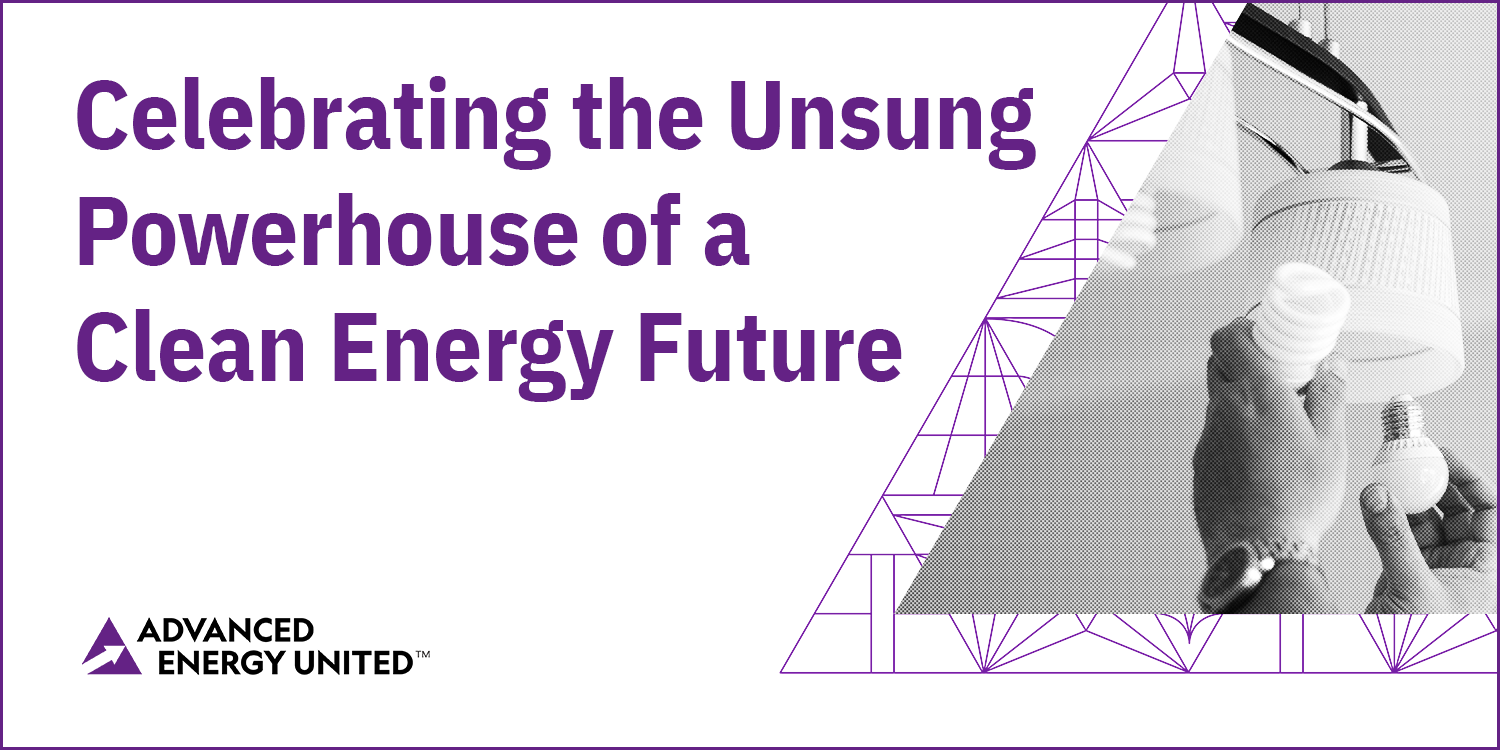
Since 2016, the United States has acknowledged every first Wednesday in October to celebrate one of the most essential players in combating climate change: energy efficiency. Bringing energy efficiency to the forefront of national observances spurs celebration of the benefits that come with it, such as lowering energy bills, reducing reliance on fossil fuels, and lowering greenhouse gas emissions. Pairing these benefits with improving grid resilience and reliability can create a healthier future for our communities and a true “powerhouse” climate solution.
Our Energy Efficiency Day post last year details how the Infrastructure Investment and Jobs Act (IIJA), which passed in 2021, and the Inflation Reduction Act (IRA), which passed in 2022, accounted for the largest investments in energy efficiency and building electrification in U.S. history, and outlined some of the incentives those pieces of legislation will deliver over the coming years. With implementation of those bills now underway, let’s take a look at the legislation’s benefits and fresh information on incentives.
Save Energy
The American Council for an Energy-Efficient Economy (ACEEE) projects that easy-to-implement efficiency measures could cut America’s unnecessary energy use in half by 2050, forecasting that 40% of the total energy savings can be delivered from buildings alone. Retrofitting outdated buildings with automation technologies for HVAC, lighting, security, access controls, and building management systems has allowed real-time communication between the building subsystems for better energy consumption coordination. Perhaps the most relatable example is the now-iconic LED lightbulb. This now widely accepted technology creates as much light as an old-fashioned incandescent, but consumes only half the energy (or less) and can last 25 times longer than an incandescent bulb. Newly implemented federal efficiency rules phasing out most incandescent bulbs are expected to save Americans nearly $3 billion a year on their utility bills.
Energy efficiency can also help alleviate the effects of the systematic injustices burdening minority communities across the country. Rural households, especially low-income, non-white, and elderly, spend an average of 40% more of their incomes on electricity bills than their metropolitan counterparts. Energy efficiency upgrades lessen these energy burdens. They can save households more than $400 a year. Policies and programs that expand access to energy efficiency tools, like the High-Efficiency Electric Home Rebate Act (HEEHRA), can create a more equitable and efficient energy system for all.
Cut Pollution
One of the biggest benefits of energy efficiency is cutting harmful emissions and reducing our carbon impact. Efficiency measures could help the United States reduce greenhouse gas emissions by 50% by 2050, getting the United States halfway to its climate goals.
Using less energy also leads to cleaner air. Reducing annual electricity use by 15% nationwide would save more than six lives every day, prevent nearly 30,000 asthma episodes each year, and save Americans up to $20 billion through avoided health harms annually.
Create Jobs
Construction and manufacturing make up 70% of the 2.25 million energy efficiency jobs in the U.S., and because these kinds of jobs can’t be outsourced, this means these jobs are here to stay. According to Job Opportunities in Advanced Energy, our report made in partnership with The Burning Glass Institute, energy efficiency jobs grew by 3% in 2021, and generated the largest number of new jobs (57,740), reflecting its oversized share of industry employment. Advanced Building Efficiency is the largest segment of the advanced energy industry, by revenue, in the U.S. You can learn more about the growth of this segment in our most recent market report, Advanced Energy Now 2023.
Grid Reliability
Yes, a bonus category! An added side effect of saving energy is improving power grid reliability, the benefits of which have been especially apparent this summer. July 2023 was recorded as the hottest month in human history, and the extreme heat, which sends people to seek refuge in air conditioning, has been leading to record levels of energy demand.
Growing electricity demand during extreme weather is one of several factors, along with aging grid infrastructure and increasingly frequent and powerful storms, leading to grid reliability concerns. Power outages lasting more than an hour and impacting more than 50,000 people have doubled in the last two decades.
The most cost-effective way to keep up with growing energy demand is deploying tools – both hardware and software – that reduce the unnecessary use of energy. If we acted on all the energy efficient solutions on the market today, we could help support a more resilient grid while helping to reverse our climate trajectory.
The 2023 Energy Efficiency Day (#EEDAY2023) slogan is simple: “Save Energy, Cut Pollution, Create Jobs.” Energy efficiency programs and policies have gotten us far in reducing our carbon emissions, creating new jobs, and saving our nation money and energy. While we are able to reap the benefits of existing efficient technologies, we are also excited to see how much more we will gain from future technologies.
As we look ahead to recognizing this year’s #EEDay2023, we invite you to celebrate the great work that our fellow advocacy groups have done to amplify this message. Please join our growing list of participants here and help spread the many benefits of energy efficiency!